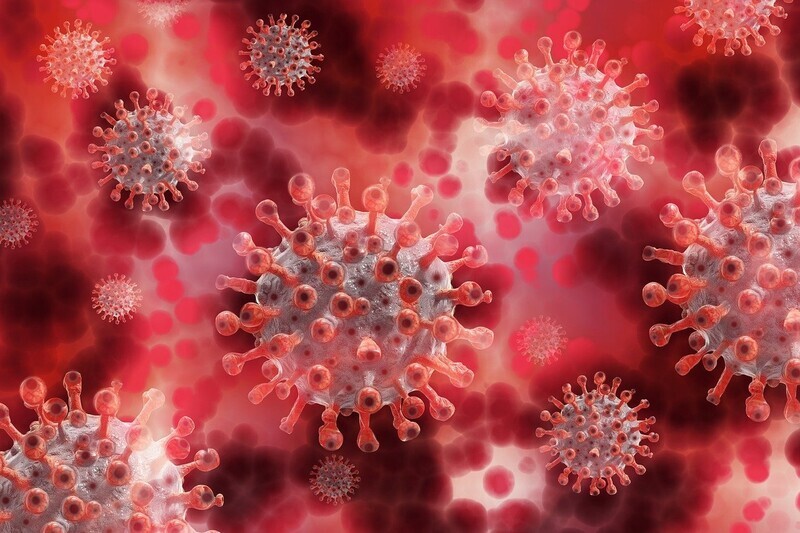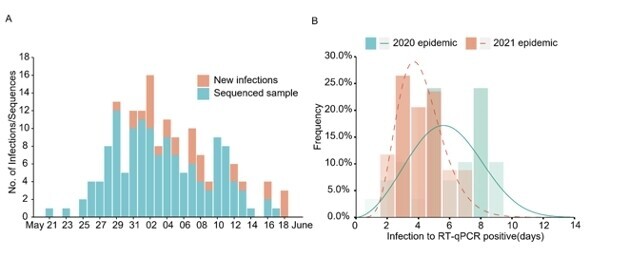hankyoreh
Links to other country sites 다른 나라 사이트 링크
Delta variant reproduces faster, has shorter incubation period than previous strains

The Delta variant of the COVID-19 virus is 1.6 times more transmissible than the Alpha variant — the first virus variant to be identified — and associated with a hospitalization rate 2.26 times, South Korea’s Central Disease Control Headquarters announced last month.
The Delta variant’s transmissibility was also estimated to be 3.2 times higher than pre-mutation strains. For now, it remains the most transmissible of all variants identified.
What accounts for this stronger transmissibility in the Delta variant?
Recently, researchers at China’s Guangdong Provincial Center for Disease Control and Prevention published certain suggestive findings in “Virological,” an online forum on viral epidemiology. Based on their epidemiological analysis of confirmed cases and examination of serum and genetic data, they identified two main reasons for the higher transmissibility.
One is that the Delta variant reproduces at a far higher rate than previous strains of the virus. The other is its shorter incubation period.
The first confirmed case in China involving the Delta variant was identified on May 21. The researchers performed a comparative analysis of virus detection levels in 62 Delta variant patients from among the 167 diagnosed in Guangdong’s capital city Guangzhou through June 18 of this year, and in 63 other patients diagnosed during the first wave in early 2020.
In the case of the Delta variant, the results showed that it took an average of four days for patients to test positive, meaning that the virus had reproduced enough within the body to be detectable. The time was two days shorter than the six-day average for the virus early on in the pandemic last year.

When a virus is detectable, that also means it is ready to be shed outside the body. Here, too, concentrations of the virus were found to be as much as 1,260 higher than for the original pre-mutation strains.
The data show that the risk of spreading is higher for the Delta variant in the early stages of infection, the researchers said.
The researchers also performed a genetic diversity analysis on samples of the virus taken by 126 patients, or 75% of all confirmed cases over the same time period. The results showed tiny mutations had already occurred in viral samples from 31 patients over less than a month.
Ten of the viral samples had found a stable host, and a portion of them was capable of being transmitted to others, the researchers added.
Joo Chul-hyun, a professor of microbiology at the University of Ulsan medical school, said the research “shows that all sorts of tiny mutations are continuing to occur and that the ones most favorable for transmission are constantly being selected for.”
Last year, German scientists announced findings showing that the early reproduction rate of SARS-CoV-2 — the official name of the COVID-19 — virus was 1,000 times faster than the virus responsible for the SARS outbreak in 2003. In the case of the Delta variant, this sort of enormous transformation emerged in the space of just one year.
In a weekly briefing Tuesday, the World Health Organization said confirmed cases of the Delta variant had been identified in 111 countries to date.
By Kwak No-pil, senior staff writer
Please direct comments or questions to [english@hani.co.kr]

Editorial・opinion
![[Editorial] Intensifying US-China rivalry means Seoul must address uncertainty with Beijing sooner than later [Editorial] Intensifying US-China rivalry means Seoul must address uncertainty with Beijing sooner than later](https://flexible.img.hani.co.kr/flexible/normal/500/300/imgdb/original/2024/0517/8117159322045222.jpg) [Editorial] Intensifying US-China rivalry means Seoul must address uncertainty with Beijing sooner than later
[Editorial] Intensifying US-China rivalry means Seoul must address uncertainty with Beijing sooner than later![[Column] When ‘fairness’ means hate and violence [Column] When ‘fairness’ means hate and violence](https://flexible.img.hani.co.kr/flexible/normal/500/300/imgdb/original/2024/0516/7417158465908824.jpg) [Column] When ‘fairness’ means hate and violence
[Column] When ‘fairness’ means hate and violence- [Editorial] Yoon must stop abusing authority to shield himself from investigation
- [Column] US troop withdrawal from Korea could be the Acheson Line all over
- [Column] How to win back readers who’ve turned to YouTube for news
- [Column] Welcome to the president’s pity party
- [Editorial] Korea must respond firmly to Japan’s attempt to usurp Line
- [Editorial] Transfers of prosecutors investigating Korea’s first lady send chilling message
- [Column] Will Seoul’s ties with Moscow really recover on their own?
- [Column] Samsung’s ‘lost decade’ and Lee Jae-yong’s mismatched chopsticks
Most viewed articles
- 1For new generation of Chinese artists, discontent is disobedience
- 2[Editorial] Transfers of prosecutors investigating Korea’s first lady send chilling message
- 3S. Korea “monitoring developments” after report of secret Chinese police station in Seoul
- 4Xi, Putin ‘oppose acts of military intimidation’ against N. Korea by US in joint statement
- 5[Exclusive] Unearthed memo suggests Gwangju Uprising missing may have been cremated
- 6N. Korean media upgrades epithet for leader’s daughter from “beloved” to “respected”
- 7Yoon says concern about biased diplomacy is being incited by “communist totalitarian forces”
- 8[Column] US troop withdrawal from Korea could be the Acheson Line all over
- 9[Editorial] Intensifying US-China rivalry means Seoul must address uncertainty with Beijing sooner t
- 10[Interview] Recalling seeing soldiers secretly burying bodies behind Gwangju Prison